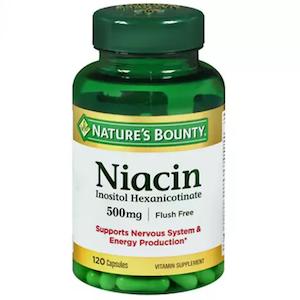For the average person, dietary supplements are a waste of time and money. Assuming a person makes an effort toward maintaining a somewhat balanced diet, nutrients are provided in sufficient quantities from everyday food. Only people who have a metabolic deficiency or are at risk of developing a specific disease should supplement their diets with particular minerals or vitamins.
Still, many people take multivitamins "just to be safe." That may not be a good idea, as some research has suggested that taking supplements unnecessarily may lead to adverse health outcomes. Now, a new paper suggests that people who consume too much vitamin B3 (niacin) might be at higher risk of developing eczema.
Because a previous study showed that niacin supplements reduced water loss through the skin, the authors hypothesized that niacin may help prevent eczema, which manifests as dry, itchy skin. To their surprise, they found that niacin supplements appeared to promote the development of eczema.
The team collected data from the Nurse's Health Study 2 (NHS2), a cohort analysis based upon surveys filled out by a large group of nurses every other year. The researchers first categorized the participants by dietary niacin intake. No matter how much niacin was consumed in the diet, there was no link to the development of eczema.
However, the authors found that participants who supplemented their diets with niacin (specifically, more than 18 mg per day) increased their risk of eczema by about 16%.

This is hardly slam-dunk evidence. The NHS2 study includes mostly white women, so the results may not apply to other groups of people. Also, it is possible that some other component in the supplement, not niacin itself, is causing the increase in eczema.
Still, this paper serves as yet more evidence that, for the average person, vitamins aren't just useless but perhaps mildly detrimental. When an adverse effect like eczema is linked to consuming 18+ mg of supplemental niacin per day, it makes 500 mg tablets (see upper left image) seem like an obscenely high dose.
*Fun fact: Hamsters that do not consume enough niacin will eat their siblings or offspring.
Source: Aaron M. Drucker, Wen-Qing Li, Min Kyung Park, Tricia Li, Abrar A. Qureshi, Eunyoung Cho. "Niacin intake and incident adult-onset atopic dermatitis in women." J Allergy Clin Immunol. Article in press. Published online: 2017. DOI: 10.1016/j.jaci.2016.12.956




